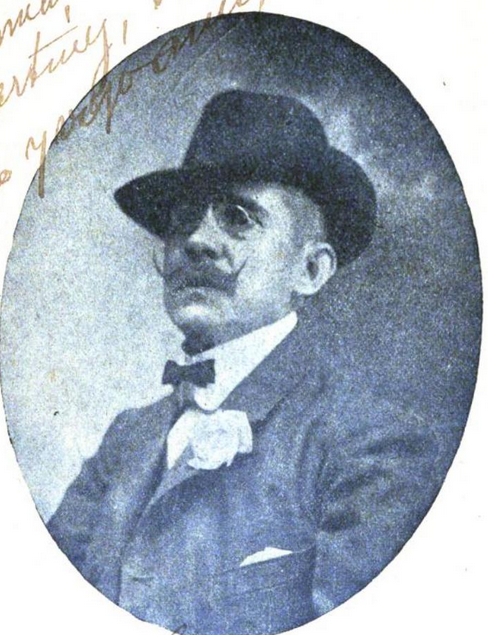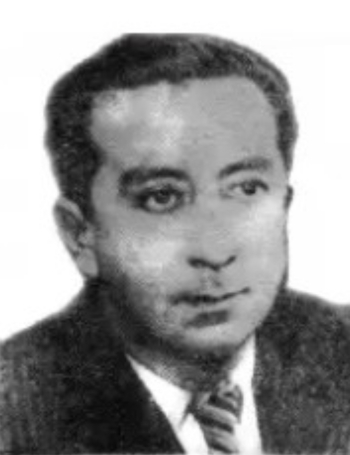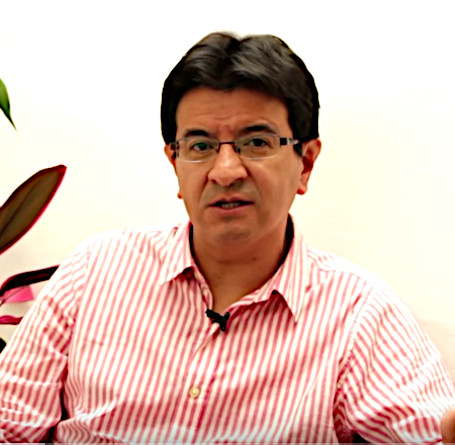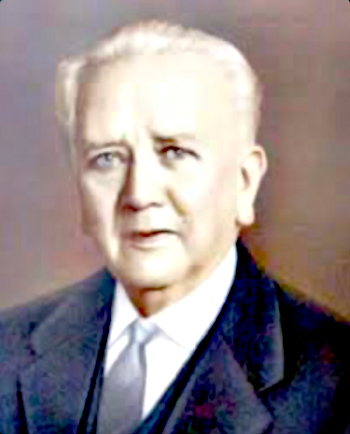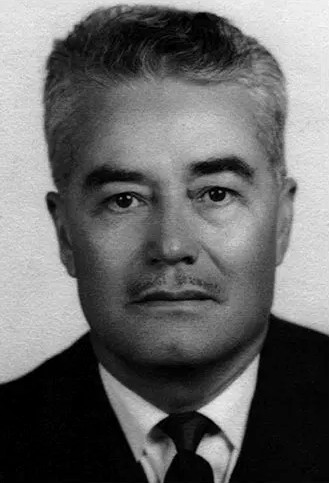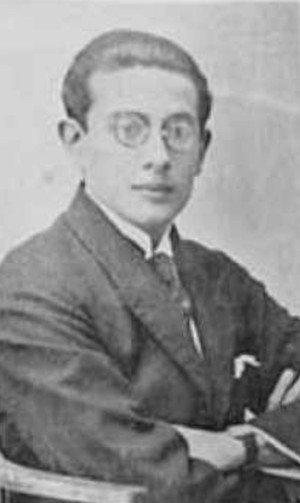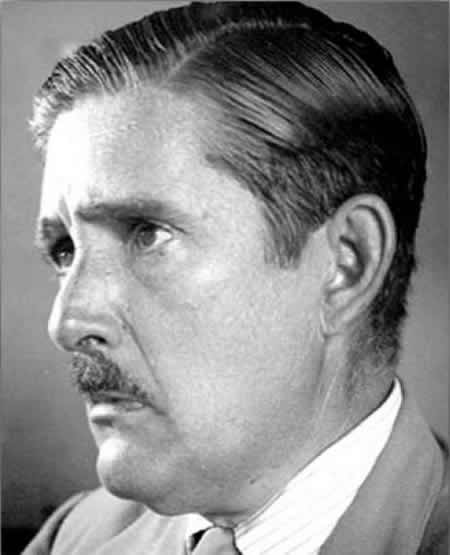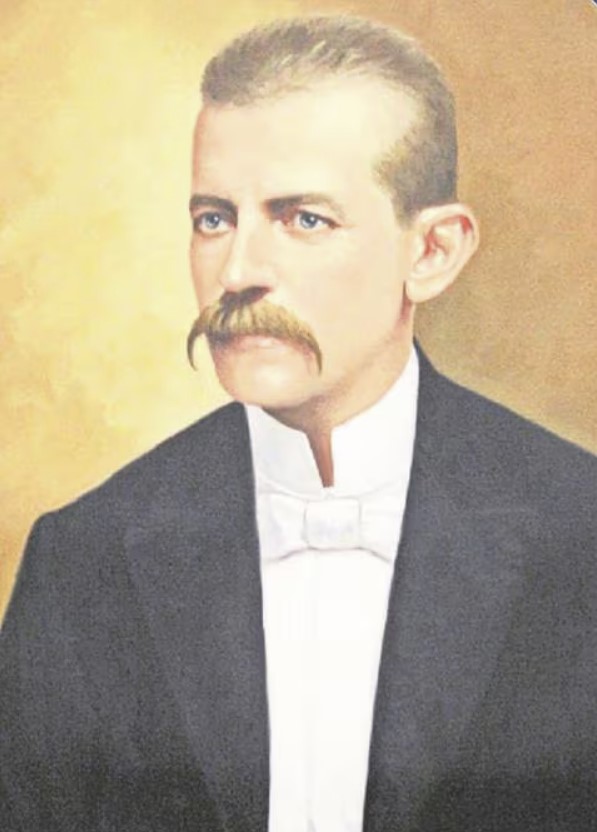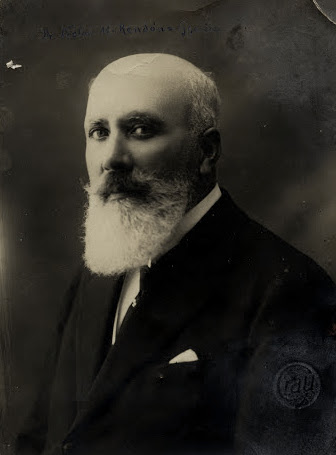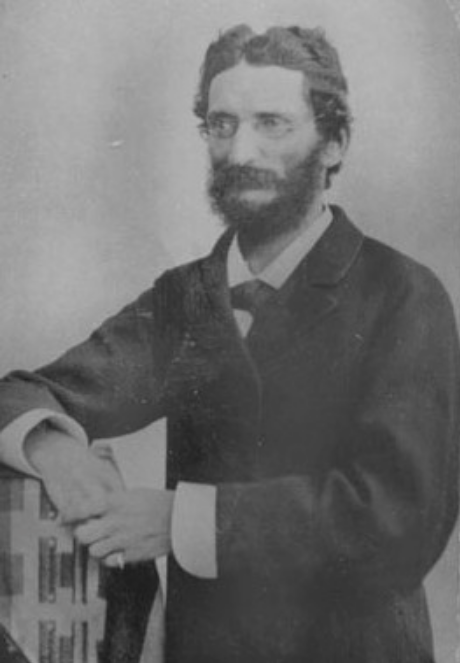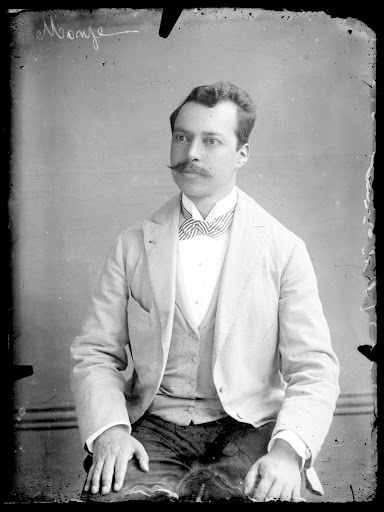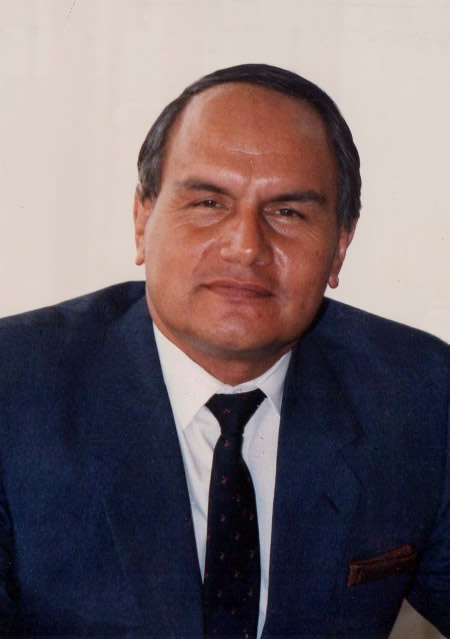Adolfo Hidalgo Nevares, sometimes spelled Nevarez, (Guayaquil, March 18, 1891 – Quito, 1934) was a doctor, writer and poet. Under the pseudonym Máximo de Bretal he wrote articles for El Guante magazine on topics such as politics, literature and poetry. He also wrote for El Telégrafo of Guayaquil and El Universitario of Quito. In 1920 he was appointed Deputy of Guayas. In 1925 he became a professor at the University of Guayaquil’s new Dentistry and Veterinary schools, and in 1926 he was named Minister of Public Education. He led a bohemian life and had an on and off again addiction to morphine which he sometimes used in the company of some of the members of the Decapitated Generation, a group of young Ecuadorian poets who died young by suicide. He too died by suicide in 1934, at the age of 43.
Continue reading “Adolfo Hidalgo Nevares”Author: richard
Nicolás Augusto González
Nicolás Augusto González Tola, also N.A. González (Guayaquil, April 14, 1858 – Buenos Aires, Argentina, January 18, 1918) was an Ecuadorian writer, playwright, novelist, journalist, poet, historian and diplomat. His plays in verse are among his best known works, which include, “Hojas secas,” “Entre el amor y el honor,” and “Amor y Patria,” which he co-wrote with Alfredo Baquerizo Moreno (President of Ecuador from 1916-1920). “Cuestión Histórica, el Asesinato del Gran Mariscal Ayacucho,” (written between 1887 and 1889), is perhaps his most important and controversial work, in which he accuses General Juan José Flores of being behind the assassination of Antonio José de Sucre, prompting hatred and persecution from Flores’ son Antonio Flores Jijón (President of Ecuador from 1888-1892). Due to his political views and polemic writing he was exiled to other countries, such as Peru, Colombia, Guatemala and Spain. From 1908-1913 he lived in Spain as a diplomat, and published there his poetry book, “Humo y cenizas” (1908) and his novel “La Llaga” (1908). He returned to Guayaquil in 1917 where a special committee chaired by José Luis Tamayo (President of Ecuador from 1920-1924) awarded him the “Golden Lyre”.
Continue reading “Nicolás Augusto González”Jorge Reyes
Jorge Reyes (Quito, 1905-1977) was an Ecuadorian poet, journalist, essayist and socialist. He directed the literary section of the socialist newspaper La tierra, and for many years he was an editorial staff writer for the newspaper El Comercio. His poetry books include: “Treinta poemas de mi tierra” (1926) “Quito, arrabal del cielo” (1930) and “El gusto de la tierra” (1977).
Continue reading “Jorge Reyes”Leovigildo Loayza Loayza
José Leovigildo Loayza Loayza (Piñas Canton, El Oro Province, October, 1905 – Guayaquil, August, 1971) was an Ecuadorian poet. He worked at the Guayaquil branch of the Central Bank of Ecuador, and at the César Borja Lavayen night school. In 1972, a high school named after him was founded in the town where he was born – El Colegio Nacional Técnico Leovigildo Loayza Loayza. He authored the lyrics of the pasillo songs “Obsesión” and “Madrigal de seda,” and also wrote poems and hymns.
Continue reading “Leovigildo Loayza Loayza”César Chávez Aguilar
César Chávez Aguilar (Tulcán, Ecuador, 1970 – November 10, 2022) was an Ecuadorian writer, bibliographer and librarian. He studied law at the Central University of Ecuador. His stories and essays were published in national and international magazines such as: Línea Imaginaria, Letras del Ecuador, and Encuentros (National Magazine of Culture). He carried out bibliographic research for the Municipality of Guayaquil and for the Benjamín Carrión Cultural Center in Quito, where he was employed as the library director. In 2012 he published “Herir la perfección,” his first book of short stories.
Continue reading “César Chávez Aguilar”Pío Jaramillo Alvarado
Pío Jaramillo Alvarado (Loja, May 17, 1884 – July 24, 1968) was an Ecuadorian writer, liberal lawyer, politician, law professor and sociologist. His best-known book El indio ecuatoriano (1922; The Ecuadorian Indian), established him as one of Ecuador’s leading intellectuals and a key participant of the indigenista movement. Born to a white mestizo family, he critiqued indigenous realities from a non-indigenous perspective, which is typical of early twentieth century indigenistas. In 1940 he led the Ecuadorian delegation to the Pátzcuaro Congress in Mexico that founded the Interamerican Indigenist Institute (III). Three years later he helped found the Ecuadorian Indigenist Institute (IIE), for which he subsequently served as director. He contributed essays to newspapers throughout the country, most significantly under the pseudonym Petronio in the liberal newspaper El Día.
Continue reading “Pío Jaramillo Alvarado”Gonzalo Rubio Orbe
Gonzalo Rubio Orbe (Otavalo, Imbabura, June 29, 1909 – October 24, 1994) was an Ecuadorian anthropologist, historian, biographer and educator. He was a protégé of Pío Jaramillo Alvarado, a key leader of the indigenista movement. Rubio’s works represent some of the earliest anthropological assessments of indigenous societies in Ecuador. His principal book is Los Indios Ecuatorianos (1987; The Ecuadorian Indians). From 1971 to 1977, he directed the Inter-American Indian Institute (III), based in Mexico. He also wrote biographies on notable Ecuadorians, such as Luis Felipe Borja and Eugenio Espejo. An indefatigable educator, he continued to lecture to university students until his dying day.
Continue reading “Gonzalo Rubio Orbe”Miguel Ángel Granado Guarnizo
Miguel Ángel Granado Guarnizo (Guayaquil, 1895 – Guayaquil, 1955) was an Ecuadorian modernist poet, playwright, and literary critic. He began publishing poetry and literary critiques as early as 1912 and was a key figure in Ecuador’s early 20th-century literary scene, co-founding the influential El Telégrafo Literario (1913). He is best known for his play El Hermano Cándido (1919), his biographical and critical work Fisonomías (1914), and his collection of critical essays Horas de Luz (1917). Granado Guarnizo was part of a close-knit literary circle that included his friend, the poet Medardo Ángel Silva. His career was tragically cut short in 1926 when he was diagnosed with a mental illness, leading to his long-term institutionalization until his death. He was the brother of the poet Carlos F. Granado Guarnizo.
Continue reading “Miguel Ángel Granado Guarnizo”José Antonio Falconí Villagómez
José Antonio Falconí Villagómez, aka Jose A. Falconí Villagómez or J.A. Falconí Villagómez, (Guayaquil, May 26, 1894 – Guayaquil, 1967) was an Ecuadorian poet, literary critic, translator, and medical doctor. In 1910 he began publishing his poems in the magazine El Guante, and by 1913 in El Telégrafo. In 1916 he founded the magazine Renacimiento, in which he published his poem, “Ruth adora a los cisnes.” He was greatly influenced by the French Symbolists of his time and was a champion of the avant-garde in poetry. In 1921 he published, “Arte Poética nº 2,” a dadaist poem which introduced the European avant-garde into Ecuadorian letters. In 1953 he was designated a Member of the House of Ecuadorian Culture. In 1964 he was decorated with the National Order of Merit, and in 1965 the city of Guayaquil conferred on him the Gold Medal of Literary Merit.
Continue reading “José Antonio Falconí Villagómez”José Joaquín Pino de Ycaza
José Joaquín Pino de Ycaza (Guayaquil, January 30, 1902 – Guayaquil, February 25, 1959) was an Ecuadorian poet, educator, historian and politician. Since as early as 14 years old he began publishing his poems in national literary magazines such as Patria and Helios, and later also in Juventud (Quito) and Proteos (Guayaquil). He directed the magazine Hermes, which published the most prominent early 20th century poets of Ecuador, such as Wenceslao Pareja, Miguel E. Neira, José Antonio Falconí, and his friend Medardo Angel Silva. In 1984 the Guayas branch of the House of Ecuadorian Culture published a collection of his poems in a small book entitled “Sándalo.”
Continue reading “José Joaquín Pino de Ycaza”Camilo Destruge
Camilo Destruge Illingworth (Guayaquil, October 20, 1863 – Guayaquil, February 26, 1929) was an Ecuadorian historian, journalist, and chronicler. He served as the first director of the Museo Municipal de Guayaquil, where he helped preserve the city’s historical artifacts, and he also directed the Municipal Library for many years. Destruge authored numerous historical works, including La Entrevista de Bolívar y San Martín (1918) and the five-volume Álbum Biográfico Ecuatoriano (1903–1905). He contributed to and edited various newspapers, such as El Telégrafo and La Nación. A member of the National Academy of History, he was also honored by the Venezuelan government with the Orden del Libertador. Declared “Cronista Emérito de la Ciudad” (Honorary Chronicler of the City), Destruge’s legacy is commemorated through a historical institution, a school, and a street named after him in Guayaquil.
Continue reading “Camilo Destruge”Víctor Manuel Rendón
Víctor Manuel Rendón Pérez (Guayaquil, December 5, 1859 – Guayaquil, October 9, 1940) was an Ecuadorian writer, poet, novelist, playwright, biographer, translator, doctor, diplomat, pianist, and composer. He wrote the novel Lorenzo Cilda in 1906 in French, later translating it into Spanish; in 1921, he was accepted into the Ecuadorian Academy of Language, and in 1925, the Académie Française awarded him a Gold Medal for the work. Rendón translated numerous works, including Olmedo, homme d’état et poète américain, chantre de Bolívar (1905), a French-language work combining a biography of José Joaquín de Olmedo with Rendón’s translations of Olmedo’s poetry. Fluent in four languages, Rendón published over forty books in Spanish and French, with works released in France, Spain, Belgium, Italy, Portugal, and Ecuador.
Continue reading “Víctor Manuel Rendón”Quintiliano Sánchez
Quintiliano Sánchez Rendón (Quito, April 13, 1848 – Ibidem, July 24, 1925) was a prominent literary figure in Ecuador, known for his contributions as a poet, novelist, journalist, translator, grammarian, and educator. His critical stance against the government of General Ignacio de Veintemilla, his directorship of the Ecuadorian Academy of Language, and his dedication to literature and education left a lasting impact. Through his captivating works, such as the novel “Amar con desobediencia,” his notable poetry like “Oda al Chimborazo,” and his translations of Latin classics, Sánchez Rendón demonstrated his artistic talent and linguistic prowess. His involvement in journalism and the founding of newspapers, along with his role as an influential teacher, further exemplified his multifaceted influence in shaping Ecuadorian literature and intellectual discourse.
Continue reading “Quintiliano Sánchez”Celiano Monge
Celiano Monge Navarrete (Ambato, December 15, 1856 – Quito, November 21, 1940) was an Ecuadorian poet, historiographer, journalist, politician, educator, and founder of various newspapers. He taught philosophy, rhetoric, mathematics and experimental physics in schools in Quito, Latacunga and Ambato. He occupied important positions within the teaching profession: he was the Director of Education of the Tungurahua and Pichincha Provinces; and later he was appointed Member of the Superior Council of Public Education. He was the secretary of the Ecuadorian Academy of Language and the director of the National Academy of History. In 1939 Monge was named “Ambato’s favorite son and official chronicler.”
Continue reading “Celiano Monge”León Vieira
León Vieira Villafuerte (Baños, October 24, 1940) is an Ecuadorian poet, novelist, biographer, journalist, painter, and teaching professor. He’s lived in Guayaquil for many years where he’s taught at various teaching schools and universities and has directed various magazines. He’s also been the vice rector of the School of Fine Arts in Guayaquil and served as Regional Undersecretary of Education. In 2016, Vieira was decorated with the Juan Montalvo Medal by the city of Ambato for his academic and literary work. His novel El doctor Jehova (1976) was a finalist of the 1972 Seix Barral Award.
Continue reading “León Vieira”